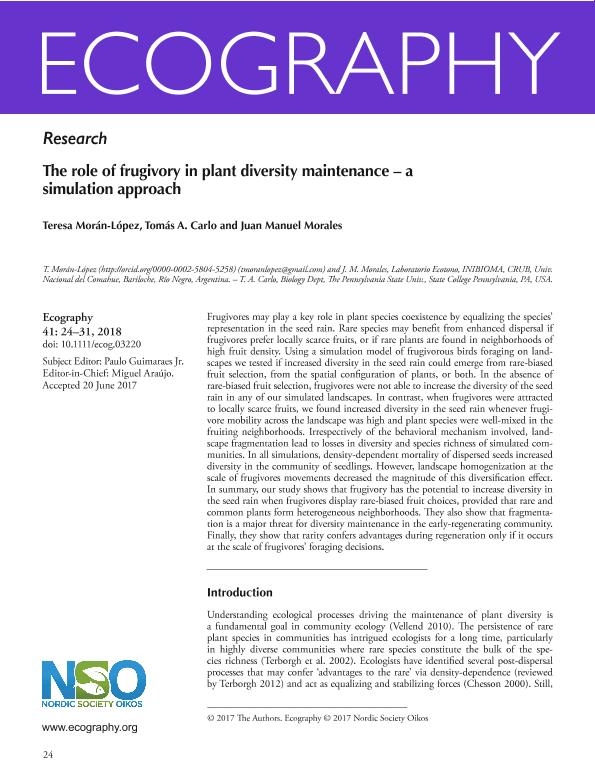Mostrar el registro sencillo del ítem
dc.contributor.author
Morán López, Teresa

dc.contributor.author
Carlo, Tomás A.
dc.contributor.author
Morales, Juan Manuel

dc.date.available
2020-02-10T20:19:00Z
dc.date.issued
2018-01
dc.identifier.citation
Morán López, Teresa; Carlo, Tomás A.; Morales, Juan Manuel; The role of frugivory in plant diversity maintenance - a simulation approach; Wiley Blackwell Publishing, Inc; Ecography; 41; 1; 1-2018; 24-31
dc.identifier.issn
0906-7590
dc.identifier.uri
http://hdl.handle.net/11336/97114
dc.description.abstract
Frugivores may play a key role in plant species coexistence by equalizing the species’ representation in the seed rain. Rare species may benefit from enhanced dispersal if frugivores prefer locally scarce fruits, or if rare plants are found in neighborhoods of high fruit density. Using a simulation model of frugivorous birds foraging on landscapes we tested if increased diversity in the seed rain could emerge from rare-biased fruit selection, from the spatial configuration of plants, or both. In the absence of rare-biased fruit selection, frugivores were not able to increase the diversity of the seed rain in any of our simulated landscapes. In contrast, when frugivores were attracted to locally scarce fruits, we found increased diversity in the seed rain whenever frugivore mobility across the landscape was high and plant species were well-mixed in the fruiting neighborhoods. Irrespectively of the behavioral mechanism involved, landscape fragmentation lead to losses in diversity and species richness of simulated communities. In all simulations, density-dependent mortality of dispersed seeds increased diversity in the community of seedlings. However, landscape homogenization at the scale of frugivores movements decreased the magnitude of this diversification effect. In summary, our study shows that frugivory has the potential to increase diversity in the seed rain when frugivores display rare-biased fruit choices, provided that rare and common plants form heterogeneous neighborhoods. They also show that fragmentation is a major threat for diversity maintenance in the early-regenerating community. Finally, they show that rarity confers advantages during regeneration only if it occurs at the scale of frugivores’ foraging decisions.
dc.format
application/pdf
dc.language.iso
eng
dc.publisher
Wiley Blackwell Publishing, Inc

dc.rights
info:eu-repo/semantics/openAccess
dc.rights.uri
https://creativecommons.org/licenses/by-nc-sa/2.5/ar/
dc.subject
FRUGIVORY
dc.subject
LANDSCAPE
dc.subject
DIVERSITY
dc.subject.classification
Ecología

dc.subject.classification
Ciencias Biológicas

dc.subject.classification
CIENCIAS NATURALES Y EXACTAS

dc.title
The role of frugivory in plant diversity maintenance - a simulation approach
dc.type
info:eu-repo/semantics/article
dc.type
info:ar-repo/semantics/artículo
dc.type
info:eu-repo/semantics/publishedVersion
dc.date.updated
2019-10-10T13:47:25Z
dc.journal.volume
41
dc.journal.number
1
dc.journal.pagination
24-31
dc.journal.pais
Reino Unido

dc.journal.ciudad
Londres
dc.description.fil
Fil: Morán López, Teresa. Consejo Nacional de Investigaciones Científicas y Técnicas. Centro Científico Tecnológico Conicet - Patagonia Norte. Instituto de Investigaciones en Biodiversidad y Medioambiente. Universidad Nacional del Comahue. Centro Regional Universidad Bariloche. Instituto de Investigaciones en Biodiversidad y Medioambiente; Argentina
dc.description.fil
Fil: Carlo, Tomás A.. State University of Pennsylvania; Estados Unidos
dc.description.fil
Fil: Morales, Juan Manuel. Consejo Nacional de Investigaciones Científicas y Técnicas. Centro Científico Tecnológico Conicet - Patagonia Norte. Instituto de Investigaciones en Biodiversidad y Medioambiente. Universidad Nacional del Comahue. Centro Regional Universidad Bariloche. Instituto de Investigaciones en Biodiversidad y Medioambiente; Argentina
dc.journal.title
Ecography

dc.relation.alternativeid
info:eu-repo/semantics/altIdentifier/doi/http://dx.doi.org/10.1111/ecog.03220
dc.relation.alternativeid
info:eu-repo/semantics/altIdentifier/url/https://onlinelibrary.wiley.com/doi/full/10.1111/ecog.03220
Archivos asociados
